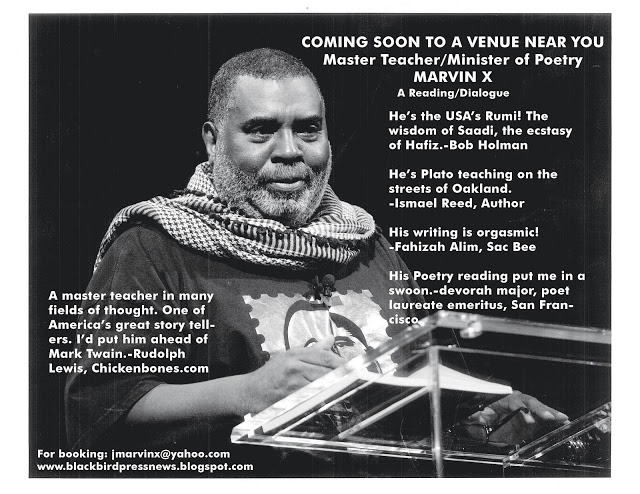Marvin X has been ignored and silenced like Malcolm X would be ignored and silenced if he had lived on into the Now. He's one of the most extraordinary, exciting black intellectuals living today!
--Rudolph Lewis, Chickenbones.com
![Marvin X]()
Marvin X's Revolution on the Rocks Book Tour 2012
Africans use proverbs to teach their children the lessons of life. Marvin X acknowledges the Yoruba influence on his book. He imparts wisdom by employing cautionary tales and uses his own life and mistakes to consul the young to avoid mistakes.
Moreover, unlike some of the books written by popular African American writers, his book does not look backward to the period of slavery, though some of that is here. He writes about the contemporary problems of a community under attack.
Marvin X exposes the situation of other ethnic groups invading Black neighborhoods and making the lion’s share of profits from vice, while the media focus upon the mules of the operation, the pathetic and disgusting pimps, the drug dealers who are killing each other over profits that are piddling next to the great haul made by the suppliers of the guns and the drugs.
Don’t expect the local newspapers to cover this end of the distribution.
In the “Parable of the Donkey,” Marvin X writes: “ The so-called Negro is the donkey of the world, everybody rides him to success. If you need a free ride to success, jump on the Negro’s back and ride into the sunset. He will welcome you with open arms.
“No saddle needed, just jump on his back and ride him to the bank.”
When you learn that the government ignored the dumping of drugs into our neighborhoods by their anti-communist allies, you can understand the meaning of Marvin X’s words. Not only are invading ethnic groups and white gun suppliers benefitting from using the Black neighborhoods as a resource but the government as well.
In “Parable of the Parrot,” Marvin X also takes aim at the Dream Team academics who “parrot” the line coming down from the One Percent that the problems of Blacks are self-inflicted.
“The state academics and intellectuals joined loudly in parroting the king’s every wish. Thank God the masses do not hear them pontificate or read their books. After all, these intellectual and academic parrots are well paid, tenured and eat much parrot seed. Their magic song impresses the bourgeoisie who have a vested interest in keeping the song of the parrot alive.”
Marvin X’s answer to this intellectual Vichy regime has been to cultivate off campus intellectuals by conducting an open air classroom (Academy of da Corner) on 14th and Broadway, downtown Oakland, which is how the peripatetic philosophers like Plato used to impart their knowledge in open air academies.
![Marvin X]() Marvin X has continued to work as a lecturer, teacher and producer. He has taught at Fresno State University; San Francisco State University; University of California - Berkeley and San Diego; University of Nevada, Reno; Mills College, Laney and Merritt Colleges in Oakland. He has received writing fellowships from Columbia University and the National Endowment for the Arts and planning grants from the National Endowment for the Humanities.
Marvin X has continued to work as a lecturer, teacher and producer. He has taught at Fresno State University; San Francisco State University; University of California - Berkeley and San Diego; University of Nevada, Reno; Mills College, Laney and Merritt Colleges in Oakland. He has received writing fellowships from Columbia University and the National Endowment for the Arts and planning grants from the National Endowment for the Humanities.
![]()
The Wisdom of Plato Negro: Parables/Fables
![BEYOND RELIGION,]() BEYOND RELIGION, TOWARD SPIRITUALITY, ESSAYS ON CONSCIOUSNESS Click to order via Amazon
BEYOND RELIGION, TOWARD SPIRITUALITY, ESSAYS ON CONSCIOUSNESS Click to order via Amazon
![BEYOND RELIGION]() In the Crazy House Called AmericaClick to order via Amazon
In the Crazy House Called AmericaClick to order via Amazon
![Love and War: Poems]() Love and War: PoemsClick to order via Amazon
Love and War: PoemsClick to order via Amazon
![Wish I Could Tell You the Truth, Essays]() Wish I Could Tell You the Truth, Essays (Signed Copy)
Wish I Could Tell You the Truth, Essays (Signed Copy)
![Somethin' Proper: The Life and Times of a North American African Poet]() Somethin' Proper: The Life and Times of a North American African Poet
Somethin' Proper: The Life and Times of a North American African Poet![]() Marvin X
Marvin X
photo Kamau Amen Ra
![]()
Somethin' Proper, the Autobiography of Marvin X, Black Bird Press, 1998
from the Introduction by Dr. Nathan Hare, the Black Think Tank
In SOMETHIN' PROPER, we quickly see that we are inside the pages not only of Marvin's private political papers, comprising a lyrical diary shaped to be read and enjoyed like a novel by the masterful hands of an internationally noted black poet, but we are being escorted to the cutting edge of a fascinating postmodern black literary genre in the making, the notes of an undying black warrior who refuses to give up, give out or give in!
Although easy to read by almost anybody wishing to do so, SOMETHIN' PROPER (apparently a phrase from the drug subculture, i.e., BREAK ME OFF SOMETHIN' PROPER), presents us at once with an opportunity for a deeper understanding of a panorama of participants in the often poignant but sometimes hilarious inner workings of the black male psyche, from the middle class bourgeois pretenders such as "tenured Negroes" on the academic plantation and their "negrocity," to "coconuts" in the corporations, and across the spectrum to brothers in the hood, particularly the way in which utility and haughty demeanor conceal and mask the panoramic and pervasive depression of the black male.
Before his death at the early age of 36, Frantz Fanon, the black psychiatrist who lived and wrote about the relations between the oppressor and oppressed in the battle of Algiers (Wretched of the Earth; Black Skin, White Masks, and A Dying Colonialism), presented us with clear psychiatric paradigms for the struggles Marvin deftly captures for us.
Marvin is able to give us insights into himself and his affiliates (Huey Newton, Eldridge Cleaver, Bobby Seale, Little Bobby Hutton, Amiri Baraka, Sonia Sanchez, Angela Davis, et.al., that are original but reminiscent of Fanon, because Marvin is bearing the covers on his life and the life of others.
Of all the many disorders and distortions that plague the black male, each and every day, perhaps the ones that take the heaviest tool on his ravished brain are those that—if not contained by armed resistance—revolve around the painful difficulty of gaining control over his individual and collective destiny, around what is known in mental health circles as "the locus of control," the dilemma of resistance to the enemy from without and the enemy from within (including the self, if we consider that there can be no master without those who, for whatever reason, are willing to be a slave). Might makes right but not for long.
If we honor the likes of Patrick Henry for saying "give me liberty or give me death," it is no matter that when the Negro says give him liberty or death the white man tries to give him death! The so-called Negro is confronted with a choice Patrick Henry had not reckoned with, something Fanon called "reactional disorders" or "psychosomatic pathology" that is the direct product of oppression.
But out of a last ditch desperation in self-medication and the management of his pulverized and thwarted emotions, in a mindless effort to soothe his psychological and social wounds, the black male is introduced unwarily if discreetly to the vicious cycle of self-mutilation and induced addiction, which takes hold and spreads like an epidemic virus as part of the psycho-technology, historically, of the white man's oppression of the North American African and others around the world.
In his powerlessness and victimization, with nothing left to lean on, the black man is likely to mount the seesaw, if not the roller coaster of racial psycho-social dependency and messianic religiosity (becoming the mad-dog religious fanatic, believing in a savior other than himself) on the one hand and the individual chemical dependent on the other, i.e. the dope fiend.
Marvin decontructs both. In the bottomless caverns of addiction in any form, there seems no amount of religiosity, coke, crack, alcohol or sex sufficient to sedate the social angst and shattered cultural strivings.
The more the black man tempts to medicate his anxiety and to mask his depression and self doubts with pretense and hostility, the more he finds himself in trouble with the persons he must love and be loved by than with the alien representatives of the society that would control and castrate his manhood.
Novelist Richard Wright, addressing these paradoxes and dilemmas in his own autobiography BLACK BOY, explained that, "Because I had no power to make things happen outside of me in the objective world, I made things happen within. Because my environment was bare and bleak, I endowed it with unlimited potentialities, redeemed it for the sake of my own hungry and cloudy yearning."
The catch is in the way these things turn out after the boy has been taken through the meat grinder of growing up within the machinery of white social control. In response, the strategy or road most taken by both Marvin X and Richard Wright, to put it simply, is FLIGHT (what Wright as a matter of fact names the middle passage of his novel, Native Son, book 2 of 3).
As surely as the individual who accepts oppression is constantly in flight from his racial identity, the black man who rejects it is constantly on the run from the agency of white supremacy that must control him and wishes to annihilate him outright. And here is where Marvin's story is most valuable to us , helping us to grasp the meaning of the tradition of escape within our race, literature and history, stretching back to the slave trade and slave ships of the middle passage, down to the demanding requirements of escape from coercion, incarceration and surveillance in the modern era: he takes us through a childhood of continual efforts to avoid juvenile hall, to the flights of his father (despite punishing ambiguities, Marvin X dedicates his book to both his parents in memorial), calling upon pure personal honesty and the deepest levels of understanding to appreciate the parental struggles of his own and the resulting psycho-sexual and social conflicts.
Without professing to do so, Marvin X speaks here most effectively of all black men, exposing their triumphs and follies, telling all he knows about everybody, including himself, always seeming to exact the hardest toll of all on himself, inviting us openly and unashamedly into the intricacies of his youthful endeavors to love too many women, including more than one try at the practice of polygamy (at one point he had four wives, in the Islamic tradition), until he realizes that if monogamy is the love and marriage of one woman, polygamy is the love or marriage of one woman too many!
I predict that SOMETHIN' PROPER (the life and times of a North American African Poet) will readily emerge as an underground classic as well as a classic of the black consciousness movement and the world of the troubled inner city, a manual of value to any brother who has lost his way and the sister who would help him to understand or know how to find it, to find it within himself, in the intriguing story of Marvin X, who has been there and the women and political fellow-travelers in the black movement who were there with him in his often daring escapades, his secret flights and open confrontations with white supremacy.
In the end, is he bitter? Or is he happy as a negro eating watermelon on massa's plantation? Well, in the beginning white people are devils—but by the end, all people are devils—in Marvin's world. After all, this is his story. Nevertheless, by the end we are convinced Marvin has regained faith in himself, his God and his people.
And it is gratifying in an era of the sellout, the faint hearted and the fallen, to see that Marvin X was one black man who met the white man in the center of the ring and walked with him to the corners of psycho-social inequity, grappling with him through the bowels of the earth, yet remained one black man the white man couldn't get.
I'm glad I stopped that day on Market Street and bought a pair of Marvin's sunglasses, but I wish I knew where to find those sunglasses now, because I could feel so proud to wear them, or, better yet, I could lend them to some other brother who was trying to find his way to SOMETHIN' PROPER while moving in the direction of the sun.
--Dr. Nathan Hare
![Marvin X Performing]()
![Land of my daughters]() Land of My Daughters: Poem's 1995-2005
Land of My Daughters: Poem's 1995-2005
Stay connected to new generation. they really can feel you. as much as you dislike rap. your style is very hip hop. Lol! brash. raw. in your face. not givin a F what anybody thinks albeit a much stronger message.
--Muhammida El Muhajir
ELDRIDGE CLEAVER - MY FRIEND THE DEVIL: A Memoir
Marvin X‘s newest book, “Eldridge Cleaver: My Friend, The Devil” is an important Expose!, notonly of whom his good friend really was… (I confess I thought something like that, in less metaphysical terms, from the day we met, at San Francisco State, 1967) But also of whom Marvin was/is. Now, Marvin has confessed to being Yacub, whom Elijah Muhammad taught us was the “evil big head scientist” who created the devil. (Marvin’s head is very large for his age.)
What is good about this book is Marvin’s telling us something about who Eldridge became as the Black Panther years receded in the rear view mirror. I remember during this period, when I learned that Marvin was hanging around Cleaver even after he’d made his televised switch from anti-capitalist revolutionary to Christian minister, denouncing the 3rd World revolutionaries and the little Marxism he thought he knew, while openly acknowledging beating his wife as a God given male prerogative, I said to Marvin, “I thought you was a Muslim” . His retort, “Jesus pay more money than Allah, Bro”, should be a classic statement of vituperative recidivism.
But this is one of the charms of this memoir. It makes the bizarre fathomable. Especially the tales of fraternization with arguably the most racist & whitest of the Xtian born agains with Marvin as agent, road manager, co-conspirator-confessor, for the post-Panther – very shot- out Cleaver. It also partially explains some of Cleaver’s moves to get back in this country, he had onetime denounced, and what he did after the big cop out. Plus, some of the time, these goings on seem straight out hilarious. Though frequently, that mirth is laced with a sting of regret. Likewise, I want everyone to know that I am writing this against my will, as a favor to Yacub.
Marvin X Articles on AALBC.com Include
Movie Reviews by Marvin X on AALBC.com include:
--Rudolph Lewis, Chickenbones.com
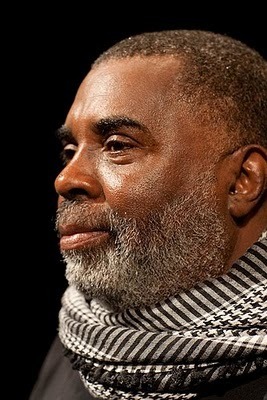
BOOK MARVIN X
as
Speaker/reader/performer
FOR BLACK HISTORY MONTH
FEBRUARY, 2013
HE'S LIVING BLACK HISTORY
A live dog is better than a dead lion!--African proverb
NATION OF ISLAM, BLACK PANTHERS, BLACK ARTS
MOVEMENT, Black Student Union, BLACK STUDIES
Went into exile and served time in Federal Prison for refusing to fight in Vietnam!
Removed from teaching Black Studies at Fresno State University, 1969, on orders from Governor Ronald Reagan, "Get him off campus by any means necessary!"
Gov. Reagan removed Angela Davis from UCLA same year.
MOVEMENT, Black Student Union, BLACK STUDIES
Went into exile and served time in Federal Prison for refusing to fight in Vietnam!
Removed from teaching Black Studies at Fresno State University, 1969, on orders from Governor Ronald Reagan, "Get him off campus by any means necessary!"
Gov. Reagan removed Angela Davis from UCLA same year.
"Marvin X is still the undisputed king of black consciousness!"
--Dr. Nathan Hare, the Black Think Tank
"Marvin X was my teacher. Many of our comrades came through his Black Arts Theatre: Bobby Seale, Eldridge Cleaver, Emory Douglas, Samuel Napier!"
--Dr. Huey P. Newton, co-founder, Black Panther Party
BOOKING AGENT: SUN IN LEO 718-496-2305
Marvin X is now available for speaking and reading at colleges and universities. He does require a freedom of speech clause in his contract. Fee: $5,000-$10.000. Contact his agent: Sun in Leo PR: 718-496-2305; prgirl@suninleo.comMarvin X's Revolution on the Rocks Book Tour 2012
Tuesday, Sept 18
Africana Studies Department, University of Houston
October 6
Kings Day at Oyutunji African Village, Sheldon, SC
October 25
Brecht Forum, Manhattan, New York
October 28
Joins Amiri and Amina Baraka at the Blue Mirror, Newark NJ
November 1
Thursday, 6-8pm, Sankofa Books, 2714 Georgia Avenue, NW, Wash DC
November 2-4
Black Power to Hip Hop Conference, Howard University, Wash DC
November 4
Sunday, 7pm, Umoja House, 2015 Bunker Hill Rd., NE, Wash DC
November 9
Friday, 7pm, Moonstone Art Center, 110 South 13th Street, Philadelphia PA
November 16
Friday, 3pm, Black and Nobel Books, 1411 West Erie Ave., Philadelphia
November 17
Saturday, 4-6pm, Black Power Babies, Restoration Plaza, Skylight Gallery, Brooklyn, NY
November 25
The Free Market Place, 905 Atlantic Ave., Brooklyn
November 26
Interview with PBS
Midnight flight to San Juan, Puerto Rico for R & R
Marvin X is Plato Teaching on Oakland’s Streets
By Ishmael Reed
Marvin X is not only a terrific writer but a Black Power historian…. However, if I had to pin down the influences upon Marvin X’s, “The Wisdom of Plato Negro, Parables/Fables,” I would cite the style of Yoruba texts: texts in the Yoruba language reveal that didacticism is a key component of the Yoruba story telling style.
Africans use proverbs to teach their children the lessons of life. Marvin X acknowledges the Yoruba influence on his book. He imparts wisdom by employing cautionary tales and uses his own life and mistakes to consul the young to avoid mistakes.
Moreover, unlike some of the books written by popular African American writers, his book does not look backward to the period of slavery, though some of that is here. He writes about the contemporary problems of a community under attack.
Marvin X exposes the situation of other ethnic groups invading Black neighborhoods and making the lion’s share of profits from vice, while the media focus upon the mules of the operation, the pathetic and disgusting pimps, the drug dealers who are killing each other over profits that are piddling next to the great haul made by the suppliers of the guns and the drugs.
Don’t expect the local newspapers to cover this end of the distribution.
In the “Parable of the Donkey,” Marvin X writes: “ The so-called Negro is the donkey of the world, everybody rides him to success. If you need a free ride to success, jump on the Negro’s back and ride into the sunset. He will welcome you with open arms.
“No saddle needed, just jump on his back and ride him to the bank.”
When you learn that the government ignored the dumping of drugs into our neighborhoods by their anti-communist allies, you can understand the meaning of Marvin X’s words. Not only are invading ethnic groups and white gun suppliers benefitting from using the Black neighborhoods as a resource but the government as well.
In “Parable of the Parrot,” Marvin X also takes aim at the Dream Team academics who “parrot” the line coming down from the One Percent that the problems of Blacks are self-inflicted.
“The state academics and intellectuals joined loudly in parroting the king’s every wish. Thank God the masses do not hear them pontificate or read their books. After all, these intellectual and academic parrots are well paid, tenured and eat much parrot seed. Their magic song impresses the bourgeoisie who have a vested interest in keeping the song of the parrot alive.”
Marvin X’s answer to this intellectual Vichy regime has been to cultivate off campus intellectuals by conducting an open air classroom (Academy of da Corner) on 14th and Broadway, downtown Oakland, which is how the peripatetic philosophers like Plato used to impart their knowledge in open air academies.
****
Ishmael Reed is the author of “Going Too Far, Essays About America’s Nervous Breakdown.”
Ishmael Reed is the author of “Going Too Far, Essays About America’s Nervous Breakdown.”
CONTACT MARVIN X @ (510) 200-4164
EMAIL: jmarvinx@yahoo.com
www.blackbirdpressnews.blogspot.com
Marvin X, also known as Marvin Jackmon and El Muhajir was born May 29, 1944 in Fowler, California, near Fresno. Marvin X is well known for his work as a poet, playwright and essayist of the BLACK ARTS MOVEMENT or BAM. He attended Merritt College along with Huey P. Newton and Bobby Seale. He received his BA and MA in English from San Francisco State University.
Marvin X is most well known for his work with Ed Bullins in the founding of Black House and The Black Arts/West Theatre in San Francisco. Black House served briefly as the headquarters for the Black Panther Party and as a center for performance, theatre, poetry and music.Marvin X is a playwright in the true spirit of the BAM. His most well-known BAM play, entitled Flowers for the Trashman, deals with generational difficulties and the crisis of the Black intellectual as he deals with education in a white-controlled culture. Marvin X's other works include, The Black Bird, The Trial, Resurrection of the Dead and In the Name of Love.
He currently has the longest running African American drama in the San Francisco Bay area and Northern California, ONE DAY IN THE LIFE, a tragi-comedy of addiction and recovery. He is the founder and director of RECOVERY THEATRE.
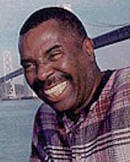 Marvin X has continued to work as a lecturer, teacher and producer. He has taught at Fresno State University; San Francisco State University; University of California - Berkeley and San Diego; University of Nevada, Reno; Mills College, Laney and Merritt Colleges in Oakland. He has received writing fellowships from Columbia University and the National Endowment for the Arts and planning grants from the National Endowment for the Humanities.
Marvin X has continued to work as a lecturer, teacher and producer. He has taught at Fresno State University; San Francisco State University; University of California - Berkeley and San Diego; University of Nevada, Reno; Mills College, Laney and Merritt Colleges in Oakland. He has received writing fellowships from Columbia University and the National Endowment for the Arts and planning grants from the National Endowment for the Humanities.Marvin X is available for lectures/readings/performance. Contact him @ jmarvinx@yahoo.com.
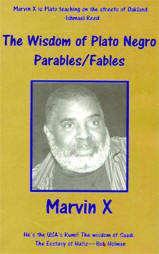
The Wisdom of Plato Negro: Parables/Fables
In “Wisdom of Plato Negro,” Marvin teaches by stories, ancient devices of instruction that appeal to a non-literate as well as a semi-literate people. (Fables differ from parables only by their use of animal characters.) The oldest existing genre of storytelling used long before the parables of Jesus or the fables of Aesop, they are excellent tools, in the hands of a skilled artist like Marvin X, in that he modifies the genre for a rebellious hip hop generation who drops out or are pushed out of repressive state sponsored public schools at a 50% clip. Marvin X is a master of these short short stories. Bibliographies, extended footnotes, indexes, formal argumentation, he knows, are of no use to the audience he seeks, that 95 percent that lives from paycheck to paycheck.
These moral oral forms (parables and fables), developed before the invention of writing, taught by indirection how to think and behave respecting the integrity of others. Marvin explained to his College of Arts audience, “This form [the parable] seems perfect for people with short attention span, the video generation… The parable fits my moral or ethical prerogative, allowing my didacticism to run full range” (“Parable of a Day in the Life of Plato Negro,” 147). But we live in a more “hostile environment” than ancient people. Our non-urban ancestors were more in harmony with Nature than our global racialized, exploitive, militarized northern elite societies.
—Rudolph Lewis is the Founding Editor of Chickenbones.com, A Journal. (Click here to read the full review).
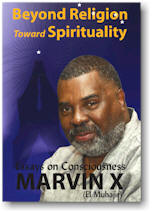 BEYOND RELIGION, TOWARD SPIRITUALITY, ESSAYS ON CONSCIOUSNESS Click to order via Amazon
BEYOND RELIGION, TOWARD SPIRITUALITY, ESSAYS ON CONSCIOUSNESS Click to order via AmazonPaperback: 281 pages
Publisher: Black Bird Press (2007)
Language: English
Marvin X has done extraordinary mind and soul work in bringing our attention to the importance of spirituality, as opposed to religion, in our daily living. Someone'maybe Kierkegaard or maybe it was George Fox who'said that there was no such thing as "Christianity." There can only be Christians. It is not institutions but rather individuals who make the meaningful differences in our world. It is not Islam but Muslims. Not Buddhism but Buddhists. Marvin X has made a courageous difference. In this book he shares the wondrous vision of his spiritual explorations. His eloquent language and rhetoric are varied'sophisticated but also earthy, sometimes both at once.
Highly informed he speaks to many societal levels and to both genders'to the intellectual as well as to the man/woman on the street or the unfortunate in prison'to the mind as well as the heart. His topics range from global politics and economics to those between men and women in their household. Common sense dominates his thought. He shuns political correctness for the truth of life. He is a Master Teacher in many fields of thought'religion and psychology, sociology and anthropology, history and politics, literature and the humanities. He is a needed Counselor, for he knows himself, on the deepest of personal levels and he reveals that self to us, that we might be his beneficiaries.
All of which are represented in his Radical Spirituality'a balm for those who anguish in these troubling times of disinformation. As a shaman himself, he calls too for a Radical Mythology to override the traditional mythologies of racial supremacy that foster war and injustice. If you want to reshape (clean up, raise) your consciousness, this is a book to savor, to read again, and again'to pass onto a friend or lover.
—Rudolph Lewis, Editor, ChickenBones: A Journal
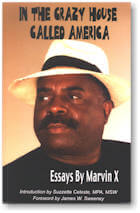 In the Crazy House Called AmericaClick to order via Amazon
In the Crazy House Called AmericaClick to order via AmazonISBN: 0964067218
Format: Paperback, 204pp
Pub. Date: January 2003
Publisher: Black Bird Press
“Rarely is a brother secure and honest enough with himself to reveal his innermost thoughts, emotions or his most hellacious life experiences. For most men it would be a monumental feat just to share/bare his soul with his closest friends but to do so to perfect strangers would be unthinkable, unless he had gone through the fires of life and emerged free of the dross that tarnishes his soul. Marvin X, poet, playwright, author and essayist does just that in a self-published book entitled In The Crazy House Called America.
This latest piece from Marvin X offers a peek into his soul and his psyche. He lets the reader know he is hip to the rabid oppression the West heaps upon people of color especially North American Africans while at the same time revealing the knowledge gleaned from his days as a student radical, black nationalist revolutionary forger of the Black Arts Movement, husband, father lover, a dogger of women did not spare him the degradation and agony of descending into the abyss of crack addiction, abusive and toxic relationships and family tragedy.
Perhaps because of the knowledge gained as a member of the Nation of Islam, and his experiences as one of the prime movers of the cultural revolution of the '60, the insights he shares In The Crazy House Called America are all the keener. Marvin writes candidly of his pain, bewilderment and depression of losing his son to suicide. He shares in a very powerful way, his own out of body helplessness as he wallowed in the dregs of an addiction that threatened to destroy his soul and the mess his addictions made of his life and relationships with those he loved. But he is not preachy and this is not an autobiography. He has already been there and done that. In sharing his story and the wisdom he has gleaned from his life experiences and looking at the world through the eyes of an artist/healer…”
—Junious Ricardo Stanton
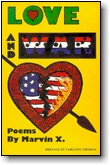 Love and War: PoemsClick to order via Amazon
Love and War: PoemsClick to order via Amazonby Marvin X. Preface by Lorenzo Thomas
Format: Paperback, 140pp.
ISBN: 0964967200
Publisher: Black Bird Press
Book of poetry by Black Arts activist, preface by Lorenzo Thomas. "When you listen to Tupac Shakur, E-40, Too Short, Master P or any other rappers out of the Bay Area of Cali, think of Marvin X. He laid the foundation and gave us the language to express Black male urban experience in a lyrical way." --James G. Spady, Philadelphia New Observer.
Have spent the last few days (when not mourning with friends and family the passing of my family friend and mentor in Muslim feminism and Islamic work, Sharifa AlKhateeb, (may she dwell in Rahma), immersed in the work of Marvin X and amazed at his brilliance. This poet has been prolific since his first book of poems, Fly to Allah, (1969), right up to his most recent Love and War Poems (1995) and Land of My Daughters, 2005, not to mention his plays, which were produced (without royalties) in Black community theatres from the 1960s to the present, and essay collections such as In the Crazy House Called America, 2002, and Wish I Could Tell You The Truth, 2005.
Marvin X was a prime shaper of the Black Arts Movement (1964-1970s) which is, among other things, the birthplace of modern Muslim American literature, and it begins with him. Well, Malik Shabazz and him. But while the Autobiography of Malcolm X is a touchstone of Muslim American culture, Marvin X and other Muslims in BAM were the emergence of a cultural expression of Black Power and Muslim thought inspired by Malcolm, who was, of course, ignited by the teachings and writings of the Honorable Elijah Muhammad.
And that, taken all together, is what I see as the starting point of Muslim American literature. Then there are others, immigrant Muslims and white American Muslims and so forth, that follow.There are also antecedents, such as the letters of Africans enslaved in America. Maybe there is writing by Muslims in the Spanish and Portuguese era or earlier, but that requires archival research of a sort I am not going to be able to do.
My interest is contemporary literature, and by literature I am more interested in poetry and fiction than memoir and non-fiction, although that is a flexible thing.I argue that it is time to call Muslim American literature a field, even though many of these writings can be and have been classified in other ways—studied under African American literature or to take the writings of immigrant Muslims, studied under South Asian ethnic literature or Arab American literature.
With respect to Marvin X, I wonder why I am just now hearing about him—I read Malcolm when I was 12, I read Amiri Baraka and Sonia Sanchez and others from the BAM in college and graduate school—why is attention not given to his work in the same places I encountered these other authors?
Declaring Muslim American literature as a field of study is valuable because recontextualizing it will add another layer of attention to his incredibly rich body of work. He deserves to be WAY better known than he is among Muslim Americans and generally, in the world of writing and the world at large.
By we who are younger Muslim American poets, in particular, Marvin should be honored as our elder, one who is still kickin, still true to the word!Love and War Poems is wrenching and powerful, combining a powerful critique of America ("America downsizes like a cripple whore/won't retire/too greedy to sleep/too fat to rest") but also a critique of deadbeat dads and drug addicts (not sparing himself) and men who hate.
"For the Men" is so Quranic poem it gave me chills with verses such as:
for the men who honor wives
and the men who abuse them
for the men who win
and the men who sin
for the men who love God
and the men who hate
for the men who are brothers
and the men who are beasts"
"O Men, listen to the wise," the poet pleads:
there is no escape
for the men of this world
or the men of the next
He is sexist as all get out, in the way that is common for men of his generation and his radicalism, but he is refreshingly aware of that and working on it. It's just that the work isn't done and if that offends you to see a man in process and still using the 'b' word, look out. Speaking of the easily offended, he warns in his introduction that "life is often profane and obscene, such as the present condition of African American people." If you want pure and holy, he says, read the Quran and the Bible, because Marvin is talking about "the low down dirty truth."
For all that, the poetry of Marvin X is like prayer, beauty-full of reverence and honor for Truth. "It is. it is. it is."A poem to his daughter Muhammida is a sweet mix of parental love and pride and fatherly freak-out at her sexuality and independence, ending humbly with:
peace Mu
it's on you
yo world
sister-girl
Other people don't get off so easy, including a certain "black joint chief of staff ass nigguh (kill 200,000 Muslims in Iraq)" in the sharply aimed poem "Free Me from My Freedom." (Mmm hmm, the 'n' word is all over the place in Marvin too.) Nature poem, wedding poem, depression poem, wake-up call poems, it's all here. Haiti, Rwanda, the Million Man March, Betsy Ross's maid, OJ, Rabin, Mumia Abu-Jamal, and other topics make it into this prophetically voiced collection of dissent poetry, so Islamic and so African American in its language and its themes, a book that will stand in its beauty long after the people mentioned in it pass.
READ MARVIN X for RAMADAN!
--Mohja Kahf Associate Professor / Dept. of English, Middle East & Islamic Studies,
University of Arkansas-Fayetteville
Marvin X was a prime shaper of the Black Arts Movement (1964-1970s) which is, among other things, the birthplace of modern Muslim American literature, and it begins with him. Well, Malik Shabazz and him. But while the Autobiography of Malcolm X is a touchstone of Muslim American culture, Marvin X and other Muslims in BAM were the emergence of a cultural expression of Black Power and Muslim thought inspired by Malcolm, who was, of course, ignited by the teachings and writings of the Honorable Elijah Muhammad.
And that, taken all together, is what I see as the starting point of Muslim American literature. Then there are others, immigrant Muslims and white American Muslims and so forth, that follow.There are also antecedents, such as the letters of Africans enslaved in America. Maybe there is writing by Muslims in the Spanish and Portuguese era or earlier, but that requires archival research of a sort I am not going to be able to do.
My interest is contemporary literature, and by literature I am more interested in poetry and fiction than memoir and non-fiction, although that is a flexible thing.I argue that it is time to call Muslim American literature a field, even though many of these writings can be and have been classified in other ways—studied under African American literature or to take the writings of immigrant Muslims, studied under South Asian ethnic literature or Arab American literature.
With respect to Marvin X, I wonder why I am just now hearing about him—I read Malcolm when I was 12, I read Amiri Baraka and Sonia Sanchez and others from the BAM in college and graduate school—why is attention not given to his work in the same places I encountered these other authors?
Declaring Muslim American literature as a field of study is valuable because recontextualizing it will add another layer of attention to his incredibly rich body of work. He deserves to be WAY better known than he is among Muslim Americans and generally, in the world of writing and the world at large.
By we who are younger Muslim American poets, in particular, Marvin should be honored as our elder, one who is still kickin, still true to the word!Love and War Poems is wrenching and powerful, combining a powerful critique of America ("America downsizes like a cripple whore/won't retire/too greedy to sleep/too fat to rest") but also a critique of deadbeat dads and drug addicts (not sparing himself) and men who hate.
"For the Men" is so Quranic poem it gave me chills with verses such as:
for the men who honor wives
and the men who abuse them
for the men who win
and the men who sin
for the men who love God
and the men who hate
for the men who are brothers
and the men who are beasts"
"O Men, listen to the wise," the poet pleads:
there is no escape
for the men of this world
or the men of the next
He is sexist as all get out, in the way that is common for men of his generation and his radicalism, but he is refreshingly aware of that and working on it. It's just that the work isn't done and if that offends you to see a man in process and still using the 'b' word, look out. Speaking of the easily offended, he warns in his introduction that "life is often profane and obscene, such as the present condition of African American people." If you want pure and holy, he says, read the Quran and the Bible, because Marvin is talking about "the low down dirty truth."
For all that, the poetry of Marvin X is like prayer, beauty-full of reverence and honor for Truth. "It is. it is. it is."A poem to his daughter Muhammida is a sweet mix of parental love and pride and fatherly freak-out at her sexuality and independence, ending humbly with:
peace Mu
it's on you
yo world
sister-girl
Other people don't get off so easy, including a certain "black joint chief of staff ass nigguh (kill 200,000 Muslims in Iraq)" in the sharply aimed poem "Free Me from My Freedom." (Mmm hmm, the 'n' word is all over the place in Marvin too.) Nature poem, wedding poem, depression poem, wake-up call poems, it's all here. Haiti, Rwanda, the Million Man March, Betsy Ross's maid, OJ, Rabin, Mumia Abu-Jamal, and other topics make it into this prophetically voiced collection of dissent poetry, so Islamic and so African American in its language and its themes, a book that will stand in its beauty long after the people mentioned in it pass.
READ MARVIN X for RAMADAN!
--Mohja Kahf Associate Professor / Dept. of English, Middle East & Islamic Studies,
University of Arkansas-Fayetteville
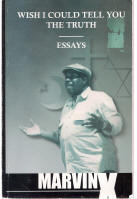 Wish I Could Tell You the Truth, Essays (Signed Copy)
Wish I Could Tell You the Truth, Essays (Signed Copy)Paperback: 215 pages
Publisher: Black Bird Press (2005)
Product Dimensions: 8 x 5.4 x 0.7 inches
Shipping Weight: 1.1 pounds
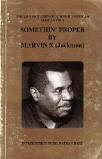 Somethin' Proper: The Life and Times of a North American African Poet
Somethin' Proper: The Life and Times of a North American African PoetPaperback: 278 pages
Publisher: Black Bird Pr (June 1999)
Language: English
ISBN-10: 0964967219
ISBN-13: 978-0964967212
Product Dimensions: 8.4 x 5.4 x 0.9 inches
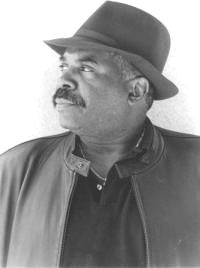 Marvin X
Marvin Xphoto Kamau Amen Ra
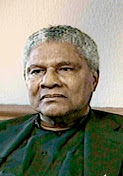
Somethin' Proper, the Autobiography of Marvin X, Black Bird Press, 1998
from the Introduction by Dr. Nathan Hare, the Black Think Tank
In SOMETHIN' PROPER, we quickly see that we are inside the pages not only of Marvin's private political papers, comprising a lyrical diary shaped to be read and enjoyed like a novel by the masterful hands of an internationally noted black poet, but we are being escorted to the cutting edge of a fascinating postmodern black literary genre in the making, the notes of an undying black warrior who refuses to give up, give out or give in!
Although easy to read by almost anybody wishing to do so, SOMETHIN' PROPER (apparently a phrase from the drug subculture, i.e., BREAK ME OFF SOMETHIN' PROPER), presents us at once with an opportunity for a deeper understanding of a panorama of participants in the often poignant but sometimes hilarious inner workings of the black male psyche, from the middle class bourgeois pretenders such as "tenured Negroes" on the academic plantation and their "negrocity," to "coconuts" in the corporations, and across the spectrum to brothers in the hood, particularly the way in which utility and haughty demeanor conceal and mask the panoramic and pervasive depression of the black male.
Before his death at the early age of 36, Frantz Fanon, the black psychiatrist who lived and wrote about the relations between the oppressor and oppressed in the battle of Algiers (Wretched of the Earth; Black Skin, White Masks, and A Dying Colonialism), presented us with clear psychiatric paradigms for the struggles Marvin deftly captures for us.
Marvin is able to give us insights into himself and his affiliates (Huey Newton, Eldridge Cleaver, Bobby Seale, Little Bobby Hutton, Amiri Baraka, Sonia Sanchez, Angela Davis, et.al., that are original but reminiscent of Fanon, because Marvin is bearing the covers on his life and the life of others.
Of all the many disorders and distortions that plague the black male, each and every day, perhaps the ones that take the heaviest tool on his ravished brain are those that—if not contained by armed resistance—revolve around the painful difficulty of gaining control over his individual and collective destiny, around what is known in mental health circles as "the locus of control," the dilemma of resistance to the enemy from without and the enemy from within (including the self, if we consider that there can be no master without those who, for whatever reason, are willing to be a slave). Might makes right but not for long.
If we honor the likes of Patrick Henry for saying "give me liberty or give me death," it is no matter that when the Negro says give him liberty or death the white man tries to give him death! The so-called Negro is confronted with a choice Patrick Henry had not reckoned with, something Fanon called "reactional disorders" or "psychosomatic pathology" that is the direct product of oppression.
But out of a last ditch desperation in self-medication and the management of his pulverized and thwarted emotions, in a mindless effort to soothe his psychological and social wounds, the black male is introduced unwarily if discreetly to the vicious cycle of self-mutilation and induced addiction, which takes hold and spreads like an epidemic virus as part of the psycho-technology, historically, of the white man's oppression of the North American African and others around the world.
In his powerlessness and victimization, with nothing left to lean on, the black man is likely to mount the seesaw, if not the roller coaster of racial psycho-social dependency and messianic religiosity (becoming the mad-dog religious fanatic, believing in a savior other than himself) on the one hand and the individual chemical dependent on the other, i.e. the dope fiend.
Marvin decontructs both. In the bottomless caverns of addiction in any form, there seems no amount of religiosity, coke, crack, alcohol or sex sufficient to sedate the social angst and shattered cultural strivings.
The more the black man tempts to medicate his anxiety and to mask his depression and self doubts with pretense and hostility, the more he finds himself in trouble with the persons he must love and be loved by than with the alien representatives of the society that would control and castrate his manhood.
Novelist Richard Wright, addressing these paradoxes and dilemmas in his own autobiography BLACK BOY, explained that, "Because I had no power to make things happen outside of me in the objective world, I made things happen within. Because my environment was bare and bleak, I endowed it with unlimited potentialities, redeemed it for the sake of my own hungry and cloudy yearning."
The catch is in the way these things turn out after the boy has been taken through the meat grinder of growing up within the machinery of white social control. In response, the strategy or road most taken by both Marvin X and Richard Wright, to put it simply, is FLIGHT (what Wright as a matter of fact names the middle passage of his novel, Native Son, book 2 of 3).
As surely as the individual who accepts oppression is constantly in flight from his racial identity, the black man who rejects it is constantly on the run from the agency of white supremacy that must control him and wishes to annihilate him outright. And here is where Marvin's story is most valuable to us , helping us to grasp the meaning of the tradition of escape within our race, literature and history, stretching back to the slave trade and slave ships of the middle passage, down to the demanding requirements of escape from coercion, incarceration and surveillance in the modern era: he takes us through a childhood of continual efforts to avoid juvenile hall, to the flights of his father (despite punishing ambiguities, Marvin X dedicates his book to both his parents in memorial), calling upon pure personal honesty and the deepest levels of understanding to appreciate the parental struggles of his own and the resulting psycho-sexual and social conflicts.
Without professing to do so, Marvin X speaks here most effectively of all black men, exposing their triumphs and follies, telling all he knows about everybody, including himself, always seeming to exact the hardest toll of all on himself, inviting us openly and unashamedly into the intricacies of his youthful endeavors to love too many women, including more than one try at the practice of polygamy (at one point he had four wives, in the Islamic tradition), until he realizes that if monogamy is the love and marriage of one woman, polygamy is the love or marriage of one woman too many!
I predict that SOMETHIN' PROPER (the life and times of a North American African Poet) will readily emerge as an underground classic as well as a classic of the black consciousness movement and the world of the troubled inner city, a manual of value to any brother who has lost his way and the sister who would help him to understand or know how to find it, to find it within himself, in the intriguing story of Marvin X, who has been there and the women and political fellow-travelers in the black movement who were there with him in his often daring escapades, his secret flights and open confrontations with white supremacy.
In the end, is he bitter? Or is he happy as a negro eating watermelon on massa's plantation? Well, in the beginning white people are devils—but by the end, all people are devils—in Marvin's world. After all, this is his story. Nevertheless, by the end we are convinced Marvin has regained faith in himself, his God and his people.
And it is gratifying in an era of the sellout, the faint hearted and the fallen, to see that Marvin X was one black man who met the white man in the center of the ring and walked with him to the corners of psycho-social inequity, grappling with him through the bowels of the earth, yet remained one black man the white man couldn't get.
I'm glad I stopped that day on Market Street and bought a pair of Marvin's sunglasses, but I wish I knew where to find those sunglasses now, because I could feel so proud to wear them, or, better yet, I could lend them to some other brother who was trying to find his way to SOMETHIN' PROPER while moving in the direction of the sun.
--Dr. Nathan Hare
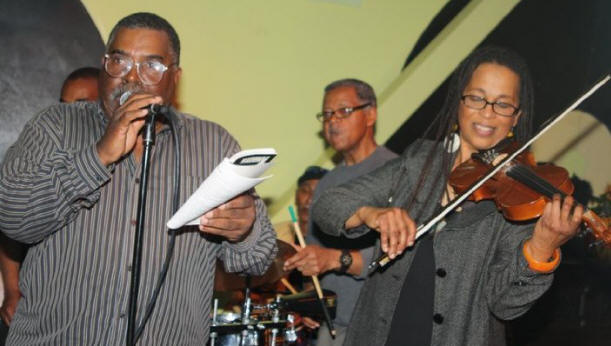
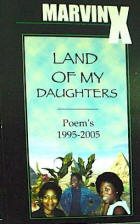 Land of My Daughters: Poem's 1995-2005
Land of My Daughters: Poem's 1995-2005Paperback: 116 pages
Publisher: BlackBird Press (2005)
Language: English
Product Dimensions: 8.5 x 5.1 x 0.4 inches
Where I’d like to start this 2005 Poetry Roundup is Iraq, as in, how did we get there and how do we get back? The consciousness-altering book of poems that tells the tale, in no uncertain terms and yet always via poetry, is the astonishing Land of My Daughters: Poems 1995-2005 (Black Bird Press) by Marvin X.
Marvin X is the USA’s Rumi, and his nation is not “where our fathers died” but where our daughters live. The death of patriarchal war culture is his everyday reality. X’s poems vibrate, whip, love in the most meta- and physical ways imaginable and un-. He’s got the humor of Pietri, the politics of Baraka, and the spiritual Muslim grounding that is totally new in English –- the ecstasy of Hafiz, the wisdom of Saadi. It’s not unusual for him to have a sequence of shortish lines followed by a culminating line that stretches a quarter page –- it is the dance of the dervishes, the rhythms of a Qasida.
Marvin X is the USA’s Rumi, and his nation is not “where our fathers died” but where our daughters live. The death of patriarchal war culture is his everyday reality. X’s poems vibrate, whip, love in the most meta- and physical ways imaginable and un-. He’s got the humor of Pietri, the politics of Baraka, and the spiritual Muslim grounding that is totally new in English –- the ecstasy of Hafiz, the wisdom of Saadi. It’s not unusual for him to have a sequence of shortish lines followed by a culminating line that stretches a quarter page –- it is the dance of the dervishes, the rhythms of a Qasida.
--Bob Holman, Bowery Poetry Club, NYC
Pull Yo Pants Up: Critical Notes on Obama Drama 2008-2012
Paperback
Publisher: Black Bird Press (2013)
Stay connected to new generation. they really can feel you. as much as you dislike rap. your style is very hip hop. Lol! brash. raw. in your face. not givin a F what anybody thinks albeit a much stronger message.
--Muhammida El Muhajir
This is a dangerous book, for it reveals the inner workings of capitalist and imperialist governments around the world. It's a book that stands with and on behalf of the poor, the dispossessed, the despised, and downtrodden.--Rudolph Lewis, editor, Chickenbones
You are the voice of the Black Man whose cry has been muffled by the clank of prison bars, the explosion of gunfire, and the loud silence of apathy and compliance.
--Fahizah Alim
--Fahizah Alim
ELDRIDGE CLEAVER - MY FRIEND THE DEVIL: A Memoir
Paperback
Publisher: Black Bird Press (2009)
Marvin X‘s newest book, “Eldridge Cleaver: My Friend, The Devil” is an important Expose!, notonly of whom his good friend really was… (I confess I thought something like that, in less metaphysical terms, from the day we met, at San Francisco State, 1967) But also of whom Marvin was/is. Now, Marvin has confessed to being Yacub, whom Elijah Muhammad taught us was the “evil big head scientist” who created the devil. (Marvin’s head is very large for his age.)
What is good about this book is Marvin’s telling us something about who Eldridge became as the Black Panther years receded in the rear view mirror. I remember during this period, when I learned that Marvin was hanging around Cleaver even after he’d made his televised switch from anti-capitalist revolutionary to Christian minister, denouncing the 3rd World revolutionaries and the little Marxism he thought he knew, while openly acknowledging beating his wife as a God given male prerogative, I said to Marvin, “I thought you was a Muslim” . His retort, “Jesus pay more money than Allah, Bro”, should be a classic statement of vituperative recidivism.
But this is one of the charms of this memoir. It makes the bizarre fathomable. Especially the tales of fraternization with arguably the most racist & whitest of the Xtian born agains with Marvin as agent, road manager, co-conspirator-confessor, for the post-Panther – very shot- out Cleaver. It also partially explains some of Cleaver’s moves to get back in this country, he had onetime denounced, and what he did after the big cop out. Plus, some of the time, these goings on seem straight out hilarious. Though frequently, that mirth is laced with a sting of regret. Likewise, I want everyone to know that I am writing this against my will, as a favor to Yacub.
—Amiri Baraka. Newark, 5/13/09
Related Links
www.blackbirdpressnews.blogspot.com
A journal dedicated to truth, freedom of speech and radical spiritual consciousness. Our mission is the liberation of men and women from oppression, violence and abuse of any kind, interpersonal, political, religious,economic,psychosexual. We believe as Fidel Castro said, "The weapon of today is not guns but consciousness."
Marvin X Articles on AALBC.com Include
The black culture police are at it again, lead running dog is Rev. Jesse Jackson, perhaps the most hypocritical culture policeman on the scene--especially after leading president Clinton in prayer over Monica while himself engaged in extramarital shenanigans. I can't take Jesse Jackson with his twisted mouth ( from lying) pontificating on moral issues while he is the most immoral of men, even pimping the blood of MLK, Jr.
Movie Reviews by Marvin X on AALBC.com include:
Order the writings of Marvin X direct from the publisher:
Black Bird Press
1222 Dwight Way
Berkeley CA 94702
jmarvinx@yahoo.com
510-200-4164
Marvin X is available for readings and lectures on a variety of topics:
How to Recover from the Addiction to White Supremacy, a mental health peer group session
How to Recover from the Addiction to White Supremacy, a mental health peer group session
The Psycholinguistic Crisis of the North American African
The Black Arts/Black Power Movement
Islam in the Bay Area
Beyond Religion, toward Spirituality
Roots of the Black Panther Party
True Mission of Black Studies as envisioned by the Black Student Union
at San Francisco State University
Revolution from Egypt to the Americas
Male/female Rites of Passage
Partner Violence, physical, verbal and emotional
